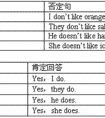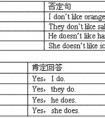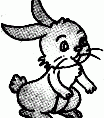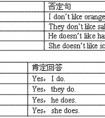句型转换。1. I studied at home last week.(改为一般疑问句) _______you____at home last week?2. The boy didn't have a key ring.(改为肯定句) The boy______a key-六年级英语
结构句型:
1.一般句子
I watched TV last night.
2.一般疑问句
Did you watch TV last night?
3.there be 句型
There was an apple on the table last night.
Was there an apple on the table last night
一般过去时并不难,过去动作、状态记心间。
动词要用过去式,时间状语句末站。
否定句很简单,didn't 站在动原前,其它部分不要变。
一般疑问句也好变,did放在句子前,主语、动原、其它部分依次站。
特殊疑问句也简单,疑问词加一般疑问句记心间。
最后一条请注意,动词过去式要牢记!
|
词 |
构成 |
举例 | |
|
一般情况 |
词尾+ed |
动词原形 |
过去式和过去分词 |
|
look |
looked | ||
|
以不发音字母e结尾 |
词尾+d |
like |
liked |
|
以“辅以字母+y”结尾 |
变y为i,再加ed |
fly |
flied |
|
以重读闭音节结尾,且末尾只有一个辅音字母 |
双写词尾+ed |
stop |
stopped |
have---had are---were get---got say---said feel---felt do/does---did is---was go---went drink--drank eat--ate bring----brought think----thought
buy----bought catch---- caught teach ---- taught sit----sat wear----wore cut----cut sweep----swept sleep——slept become----became
考点名称:助动词
助动词:
协助主要动词构成谓语动词词组的词叫助动词,被协助的动词称作主要动词。
构成时态和语态:助动词是语法功能词,自身没有词义,不可单独使用,它没有对应的汉译,
例如:Hedoesn'tlikeEnglish.他不喜欢英语。(doesn't是助动词,无词义;like是主要动词,有词义)- 小学涉及到的助动词主要是do,以及它的两种时态:does和did。
例:Does he work in the factory? 他是在这个工厂工作吗?
Do you have a pen? 你有一支钢笔吗?
He didn’t go to school yesterday. 他昨天没有去上学。
助动词do 的用法:
1)构成一般疑问句,例如:
Do you want to pass the CET? 你想通过大学英语测试吗?
Did you study German? 你们学过德语吗?
2) do + not 构成否定句,例如:
I do not want to be criticized. 我不想挨批评。
He doesn't like to study. 他不想学习。
In the past, many students did not know the importance of English. 过去,好多学生不知道英语的重要性。
3)构成否定祈使句,例如:
Don't go there. 不要去那里。
Don't be so absent-minded. 不要这么心不在焉。
说明: 构成否定祈使句只用do,不用did和does。
4)放在动词原形前,加强该动词的语气,例如:
Do come to my birthday party. 一定来参加我的生日宴会。
I did go there. 我确实去那儿了。
I do miss you. 我确实想你。
5) 用于倒装句,例如:
Never did I hear of such a thing. 我从未听说过这样的事情。
Only when we begin our college life do we realize the importance of English.
只有在开始大学生活时我们才认识到英语的重要性。
说明: 引导此类倒装句的副词有never, seldom, rarely, little, only, so, well等。
6)用作代动词,例如:
---- Do you like Beijing? --你喜欢北京吗?
---- Yes, I do. --是的,喜欢。(do用作代动词,代替like Beijing.)
He knows how to drive a car, doesn't he?
他知道如何开车,对吧? - 基本助动词:
be, do, have, 他们没有词汇意义,只有语法作用,如协助构成进行体,完成体,被动态,否定句,疑问句等。
例如 He is giving a lecture. 他在作报告
He has made a plan. 他已经订了计划
The small animals are kept in the cages. 小动物都关在笼子里。
助动词协助主要动词完成以下功用:
a. 表示时态,例如:
He is singing. 他在唱歌。
He has got married. 他已结婚。
b. 表示语态,例如:
He was sent to England. 他被派往英国。
c. 构成疑问句,例如:
Do you like college life? 你喜欢大学生活吗?
Did you study English before you came here? 你来这儿之前学过英语吗?
d. 与否定副词not合用,构成否定句,例如:
I don't like him. 我不喜欢他。
e. 加强语气,例如:
Do come to the party tomorrow evening. 明天晚上一定来参加晚会。
He did know that. 他的确知道那件事。
考点名称:肯定句
- 对事物作出肯定判断的句子叫肯定句。
对事物作出否定判断的句子叫否定句。
结构:主语+谓语+其他
例:Tom played football yesterday afternoon. 汤姆昨天下午打篮球了。
This is my bedroom. 这是我的卧室。 - 肯定句分类:
A、使用“是”字句,也叫判断句。
B、使用一般的肯定句式。 肯定句、否定句、一般疑问句和特殊疑问句的相互转换:
1、有am, is, are的句子,
就划线部分提问(变特殊疑问句)
This is a book.
第一步:变一般疑问句 Is this a book?
第二步:找合适的特殊疑问词 Is this what ?
第三步:特殊疑问词提前放到句首,并大写,其余按顺序照抄,省略划线部分。What is this?2、没有am, is, are的句子,
肯定句变否定句:在主语后面加上do not或者does not,其余按顺序照抄动词用原形
肯定句变一般疑问句:在句首加do或者does并大写,其余照抄。注意:动词用原形
肯定句变特殊疑问句(就划线部分提问):分3步骤
第一步:先变一般疑问句
第二步:找合适的特殊疑问词代替划线部分
第三步:特殊疑问词提前放到句首,并大写,其余按顺序照抄,省略划线部分。
注意:一定先变一般疑问句。但是,如果问的是主语或主语的定语时,语序不变,为"特殊疑问词(+主语)+陈述句"。3、划线部分不能在特殊疑问句中出现。
非单三时用do,单三时用does
非单三:
肯定句:I like English.
一般疑问句:Do you like English?
否定句:I do not like English.
单三 :
肯定句:He likes English.
一般疑问句:Does he like English?
否定句:He does not like English.
就划线部分提问:
I like English.
第一步:先变一般疑问句 Do you like English?
第二步:找合适的特殊疑问词代替划线部分Do you like what?
第三步:特殊疑问词提前放到句首,并大写,其余按顺序照抄,省略划线部分。What do you like?4、特殊:
①some变为any。如:
There are some birds in the tree.→There aren't any birds in the tree.
但是,若在表示请邀请、请求的句子中,some可以不变。如:
Would you like some orange juice?
与此相关的一些不定代词如something, somebody等也要进行相应变化。
- 最新内容
- 相关内容
- 网友推荐
- 图文推荐
| [家长教育] 孩子为什么会和父母感情疏离? (2019-07-14) |
| [教师分享] 给远方姐姐的一封信 (2018-11-07) |
| [教师分享] 伸缩门 (2018-11-07) |
| [教师分享] 回家乡 (2018-11-07) |
| [教师分享] 是风味也是人间 (2018-11-07) |
| [教师分享] 一句格言的启示 (2018-11-07) |
| [教师分享] 无规矩不成方圆 (2018-11-07) |
| [教师分享] 第十届全国教育名家论坛有感(二) (2018-11-07) |
| [教师分享] 贪玩的小狗 (2018-11-07) |
| [教师分享] 未命名文章 (2018-11-07) |





![____ it got four wheels?[ ]A. Have B. There C. Has-五年级英语](http://www.00-edu.com/d/file/ks/4/1/65/2019-08-31/small2ca0aeba76320ba6f81e40fe83a0e8111567199443.png)
